There’s a new sheriff in town. Emily Andras, (Lost Girl, Killjoys) the showrunner and executive producer of the hot new SyFy show Wynonna Earp, sat down to chat with us about the multi-genre show that already has fans all atwitter (and a Twitter). The show is led by some pretty badass ladies and is queer-inclusive, something that Andras is known for. We spoke to Andras about bringing Wynonna from the comic book to the small screen, the rise in female fronted shows, and how tropes have suddenly come under much more scrutiny by fans and the media.
The Mary Sue: So I want you to know that I went to The Mary Sue and pretty much was like “please let me write about Wynonna Earp,” and thankfully, they said yes, because they are amazing. I may be a critic, but I’m first and foremost a fangirl. What’s the reaction been like from fans these first few episodes?
Emily Andras: It has honestly been mindblowing and I’m not just saying that. I mean, you work so hard on something and you put your heart and soul into it, but the funny thing about art is you never have any guarantee that it’s actually going to be good [laughs] or that anyone is going to like it. So I have just been so delighted and so gratified that people seem to get what we are trying to do with this show. I really am thrilled that they see how special this cast is—just their chemistry and their ability, particularity Melanie Scrofano. I just think she is extraordinary as Wynonna, and I’m so happy that she’s getting all these accolades, and that people really love that she’s both tough and funny and sardonic and vulnerable.
I’m just so happy that we are at a point where everybody is willing to not only embrace but love a female heroine like that. Also it’s kind of a weird mash-up of genres—supernatural, western, grindhouse, soap opera, paranormal investigative series with a big mythology. I’m just so happy the audience is like “yep, we’re on board. We don’t even care. We just love the way it makes us feel.” So I have been floored, Dana, like I have just been blown away. I’ve never really seen a show I’ve been involved with launch like this, as far as social media buzz and just positive reviews. I don’t know. Pinch me.
TMS: That’s amazing. You know, I got turned on to the show based on what my friends were saying on Twitter. I had heard about it and I had planned to tune in, but they I read the tweets that my friends had been posting and I was like, wow, they really like this show. I definitely have to tune in.
Andras: Oh that’s so good.
TMS: I read that it was pretty much love at first sight for you when you picked up a copy of the comic book Wynonna Earp, that the show is based on. How were you able to bring Wynonna to life?
Andras: Yeah, as soon as I picked up the comic book—let’s be honest, what you’re a working writer you have to be pretty open minded and there are a lot cops shows and hospital shows out there, and a lot of procedurals. That’s all fun and you have to be able to throw yourself head first into whatever you do, but when I picked up the comic, I really got all tingly. I really was like, oh my god, if I could just cook something up for myself in a magic cauldron, this is everything I would pick. I loved that it had this crazy heroine, I loved the paranormal aspect, I loved the sort of flipping of Wyatt Earp on his side, and I loved that fact that it was set out West, because that’s where I’m from.
Now the other sort of flip side to that is that it was definitely a comic book from the 1990s, so if you pick up the original comic book, it has a definite flavor. If we were going to be imitative, we would save a lot of money on wardrobe because she was wearing like bandages and a g-string while you fight mummies. I don’t know what you wear when you fight mummies.
TMS: Usually a sensible flannel.
Andras: That’s me, but like whatever. But the truth is, what appealed to me was the idea of making it kind of a world of women. So even though you think of the American West as a very kind of masculine genre, with a very strong patriarchal tradition and lots of themes of brotherhood. Just because of how lucky I’ve been with the kind of work I’ve done in genre with a very strong feminist bent, I was like, I really want to flip that and make it about all these powerful women, running around the West, just kicking ass.
So I came in with a really strong pitch to IDW, and certainly there were some ideas that didn’t exist in the comic—she didn’t have sisters, and Doc and Dolls didn’t exist in the comic. Honestly, thank god for IDW and Ted Adams, the CEO, and all those guys—they just loved it. They totally got it. I was like, “If Buffy meets Justified meets Frozen …
TMS: [laughs]
Andras: I know. It’s the craziest pitch of all time.
TMS: I’m sold.
Andras: I know. It’s pretty fun. But at the same time, it’s so insane that I think the network was like, wow, if you can pull this off, we can definitely say we haven’t seen this before. I felt really supported and that’s the truth. I felt very clearly in my guts what I wanted it to be. That being said, one thing that has really resonated with me is I’m so delighted that people love the sister relationship. I knew people would like it, but I didn’t think they’d fall in love with the Earp girls as much as they have, so that’s been really great. Anyway, like with most things, a pilot is filled with a lot of work. Pilots tend to take two to three years, honing them and changing them and trying to decide on tone and darkness. Is this an 8pm show or is it a 10pm show? We definitely made it like a grindhouse 10pm show, which is really fun. And now here we are.
First seasons are always really, really hard. You’re setting the look and feel and tone of everything, and you’re building sets and casting. It’s definitely the hardest thing I’ve ever done in my career, 100%. But it is also incredibly gratifying. It’s like giving birth, I always say. When you’re in it, you’re like, I’m never doing that again, and then you get this beautiful baby in chaps and cowboy boots and you’re like, “aw, she’s so beautiful, I can’t wait to do more with her.” I hope I get the chance.
TMS: What you are saying really leads into my next question. You’re known as a showrunner who deals with “strong female characters” in a really positive and progressive way. They aren’t being fridged, they have their own journeys, their own flaws and attributes. Is it still a tough sell to bring these types of characters to the small screen, or has the industry finally begun to realize that there is a hungry and interested audience?
Andras: I think that it’s less a tough sell, I really want to be positive about it. I think that we are seeing more strong female characters on television than ever before, and there are still going to be missteps, which we are seeing all the time with these characters. But remember, twenty years ago, we never even had these characters. I’m not making excuses. I’m just saying that is one thing I think should be celebrated.
I think I’m at an advantage with two things. One, I’m in Canada. It’s incredibly progressive here and I’m like, I’m just going to do this and people don’t really bat an eye. And the other thing is just genre. I think that genre has always been really progressive as far as maybe reflecting society a little more clearly than say, network television, which has to kind of run down the middle as far as attitudes, and sometimes it just takes a little bit longer to catch up. But when you’re on cable and you’re writing for genre, I mean, the truth about genre is you can kind of trick people—which sounds terrible—but because you’re dealing with the fantastical and supernatural, all of that, genre is really an opportunity to talk about things regarding what it means to be human. I mean we’ve seen that since Star Trek. So I kind of just sneak it in, and it’s not like I’m fooling anyone but I think those are just the female characters I end up writing.
I do feel a responsibility—maybe not a responsibility—I’m just not that interested in any character that is one-dimensional. You know what I mean? It just bores me. It’s not challenging anymore. I’d rather write about someone who is complicated. What a niche to have found myself in. Talk about a privilege. It’s incredible. It’s incredible to hear you say that I’m known for that. That’s just lovely. Thank you.
TMS: Wynonna is my favorite kind of heroine: tough as nails but tender hearted. She says and does what she wants, but she’s also completely loyal to those she loves. What is it about Wynonna that makes her such a compelling hero in your opinion?
Andras: She just makes me want to cry I love her so much. I think the thing about Wynonna that I really love is she has had such a raw deal. She has had such a tough life and she has every reason in the world to give up, but she never does. I just think that give me chills. I love writing that type of female character who has had terrible things happen to her, who is seen through a certain lens, who’s been labeled certain things by the people she grew up around, but still gets up in the morning everyday, takes a swig of whiskey and picks up the gun and goes out to fight for what she thinks is right. She’s starting to refuse to let other people define her. She’s going to damn well find her own path, even if it kills her. I also just like that technically she doesn’t really have super-duper powers. She’s blessed on some level but she’s kind of a fuck-up. But she’s going to go out and do this thing. For someone who is so broken, maybe this is finally a chance to do something right. Maybe this is a chance for her to find out what she’s good at. So that’s what I love about her. I love that she uses humor to diffuse situations. I love that she refuses to let the men in her life have the last word. I love that she doesn’t apologize for who she is.
I just think that performance has come to life through Melanie Scrofano. That partnership, I feel like has just changed my life. I think as much as I loved Wynonna on the page, and I’m incredibly proud of it, I really want to give props to what Melanie has done with that character. I really think it is a unique heroine that we haven’t seen on television before, because of her performance. I’m just so incredibly proud of her.
TMS: You mentioned earlier that Waverly isn’t in the comic books, and she’s already a fan favorite. One of the most talked about things on the show has been the wonderful flirtation between Waverly and Officer Haught. They even have multiple shipper names. ONLY 4 EPISODES IN!! Congrats on that. How did Waverly come to life and what made you decide to give her a potential female love interest?
Andras: I have to tell you, without being on a soapbox, I feel like I have a lot of LGBT friendships and relationships in my own life, and anytime that I am given the chance to create a world, I really want it to reflect the world that I live in. So I don’t think I will ever create a show that doesn’t have LGBT representation, in a way that I feel really is just part of the character, but doesn’t define the character.
I was quite interested in the idea of opposites. I think there’s something interesting with sisters, especially the Earp sisters, where they absolutely adore each other but I feel like they are envious of what the other one has. That’s how things really came to life for me—when I realized that Waverly is beloved in the town and is kind of a good girl and has always done everything right. But on some level, she wishes she could be the hero, that she could be the Earp heir. Or if Wynonna, for all of her sardonic, cynical outer shell, would love just not to be hated. To be loved the way that Waverly is loved and supported. That to me is when it sort of came to life as far as the sister relationship.
But I also think there is a story that doesn’t often get told on television, without giving too much away, is that not everyone wakes up at like 12 years old and realizes they’re gay or bisexual or have fluid sexuality. Especially if you have kind of been determined to live your life a certain way in a certain small town. I think that’s a really common story. And maybe you start to question what you want and who you are a little bit later in life, like early in your twenties. I think it’s going to be interesting to see Waverly kind of deal with these new feelings—whatever she feels with Officer Haught. And I really feel that Officer Haught is clearly gay and not apologizing for it and knows what she wants. I feel like that’s a character we don’t see on television that much as far as LGBT representation. And she’s not a villain, she’s just like a person right now.
I do think the response has been amazing though, that in that one two minute scene, the chemistry that those two actresses have, like blew the pants off everybody.
TMS: Literally.
Andras: Right, literally blew the pants off. And if that’s my legacy, I’m fine with that. If WayHot [or WayHaught] is what I’m known for, then job done. I just like too that people loved the spirit in which it was delivered. And kudos to Dominique Provost-Chalkley. I feel like the myriad of emotions that crosses Waverly’s face in that scene is unbelievable. She’s like, completely turned on, completely flummoxed, completely confused, and completely intrigued.
TMS: It’s played in a really fun way, but there’s a level of authenticity to it that I think queer audiences pick up on, immediately.
EA: And again, without giving too much away, I would say I spoke pretty closely with the actors involved in those relationships and it’s always important to all of us to portray it as a real thing. A real relationship with real people with real flaws and real issues—and not because they may or may not be gay, but because they are people. I think that’s one thing I really learned from Lost Girl. Every gay relationship is not the same, in the same way that every straight relationship is not the same. That’s what I kind of hope we’ve evolved to on television—that we can tell different stories about LGBT characters. It doesn’t have to be the same story every time, and hopefully it doesn’t have to end in tragedy all the time.
TMS: Ok so hold that thought, because that’s where I’m going next and I think you knew I was going to. You were behind another very popular and much loved female fronted show, Lost Girl. It also happened to include some of the best depictions of queer women on TV. I’m sure you have been keeping up with the fandom revolution that’s been happening in regards to queer women dying at an alarming rate in television shows. What are your thoughts on what you’ve been seeing from the perspective of someone who is creating characters and shows? I’m particularly interested because there’s been a lot of commentary that people won’t want to create LGBT and queer women characters in particular, because they don’t want to deal with potential backlash?
Andras: Well I think that’s bullshit. I do think that’s bullshit. That’s terrifying to me to think that like, oh my god, I’m just not going to include a gay character or a character of color or a character who wears a funny hat because the hat people might get mad if I put them through tragedy. First of all I want to say, just generously as a creator, I’m 90% sure those showrunners and writers are having a real tough time of things right now. That’s not to excuse the fact that the fanbase is having an incredibly tough time with what’s happening. I mean, talk about an insane year. Just insane. And it is concerning for me that this is all happening at once. I think part of it is reflective of the fact that we are getting more characters of color and more characters that are LGBT representative than ever before. I do think there is kind of a disturbing trend right now where a lot of women are being fridged, and a lot of characters are kind of being dispatched in a way that follows certain tropes that showrunners may or may not be aware of.
Look, this is the absolute truth and people don’t like to hear it, but what the fanbase wants is not always what is best for drama. First of all, I’ll just say that without making apologies. If you are on a show where danger is ever-present, and the stakes have to be that anyone is expendable, sometimes you have to put your money where your mouth is, and I don’t think someone should not be expendable just because they happen to be a girl who likes girls. That being said, for me personally, I would really strive to never punish a character because of their sexuality. Do you know what I mean? I think that is the connection that is being missed here. It’s the Bury Your Gays trope, right, that we are seeing time and time again that I think showrunners and creators need to become more familiar with. And also, if you are courting a community that maybe doesn’t see themselves represented in a positive way on television very often, I urge writers to recognize the responsibility with that. You know what I mean? Particularly for young people who may be striving to see themselves represented on television. Just maybe be very cautious about engaging a fandom that you may be turning around and betraying in a particular, very personal way.
I think the one thing that is happening that is positive out of all of this is that it is getting attention in a way that maybe it hasn’t before. People have to be incredibly aware of what’s happening. For me, I’m not going to promise there’s not going to be drama in my shows. I’m not going to promise that LGBT characters aren’t going to be put through the ringer or put into dangerous situations, but I hope I can deliver a satisfying romantic relationship that is separate from any danger or peril that happens on the screen due to the supernatural circumstances.
TMS: I’m seeing a lot of young, talented folks out there who are inspired by people like yourself who want to create inclusive, entertaining shows, but don’t know how to get started. What would be your advice for those writers, creators and future showrunners?
Andras: I would definitely say, write what you want to write. One thing that is happening that is really interesting is that happening, particularly if you are looking to write something that has LGBT representation or strong female characters, is really webseries. Webseries are getting a lot of attention, that kind of address those things that are considered quite niche. If you are really hungry to tell a story that you feel is not going to get on network television, I would urge you to try to write a webseries. I think that is something that more and more, TV is going to look to try and translate into broadcast television. So that’s one thing you can do. And in a weird way, it’s such an amazing time to be writing female driven stories and LGBT driven stories and diverse stories, because look—networks are listening to what the fanbase wants. And god bless, the fandom is rattling its cages. They know what they want. So I would encourage you to write what you want. Don’t listen to what anyone else tells you at this stage. We are catching up at a blistering pace, and in the next six months, I think you are going to see more and more of these types of shows getting greenlit. So go for it.
Wynonna Earp airs on Syfy, Fridays at 10pm EST. You can follow the show on Twitter at @WynonnaEarp and Emily Andras at @emtothea.
Dana Piccoli is a pop culture critic and entertainment writer who lives recently relocated from New York to Greenville, SC. She’s a current writer and former Staff Editor of AfterEllen and covers The 100 for Alloy Entertainment. She’s also written for Curve Magazine, Go Magazine, PopWrapped, and Gaygamer.net. She’s currently writing a lesbian romance novel she’s hoping you will read one day soon. You can follow her on Twitter and Tumblr.
—The Mary Sue has a strict comment policy that forbids, but is not limited to, personal insults toward anyone, hate speech, and trolling.—
Follow The Mary Sue on Twitter, Facebook, Tumblr, Pinterest, & Google+.



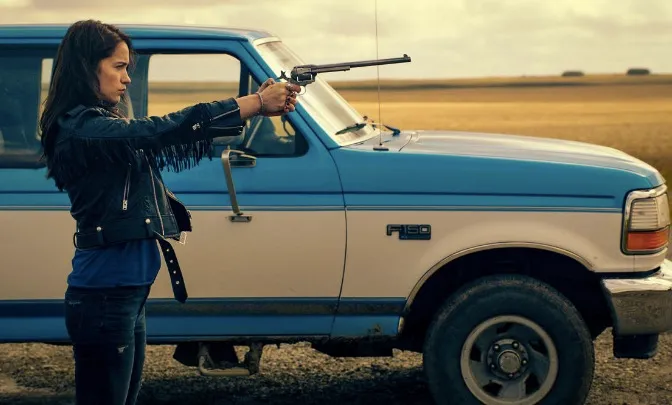
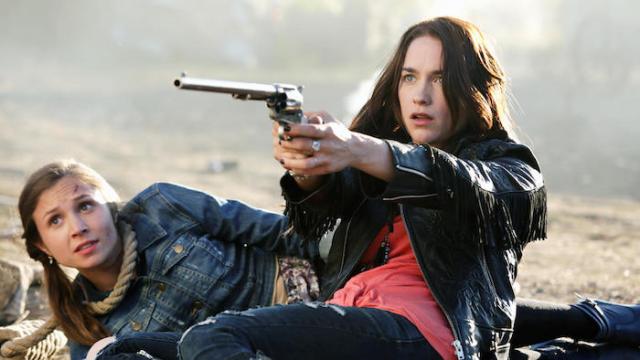
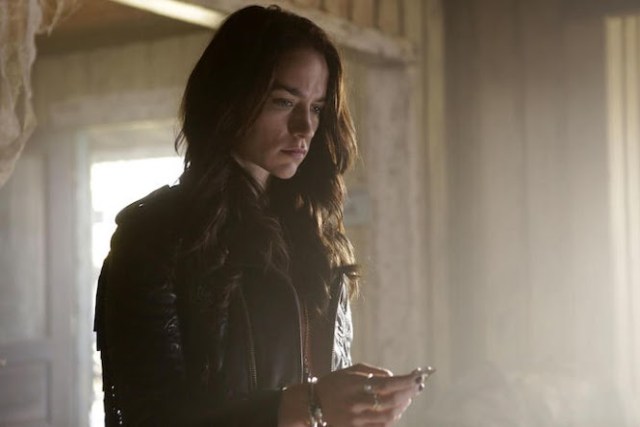
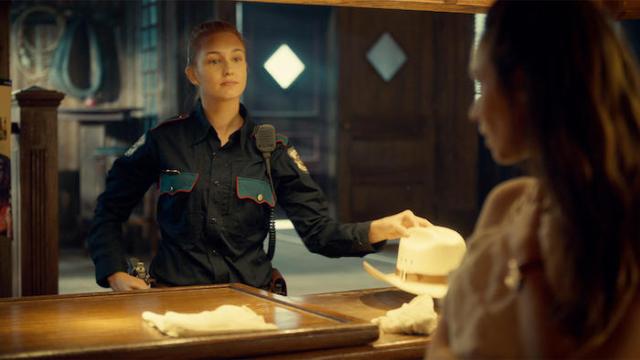
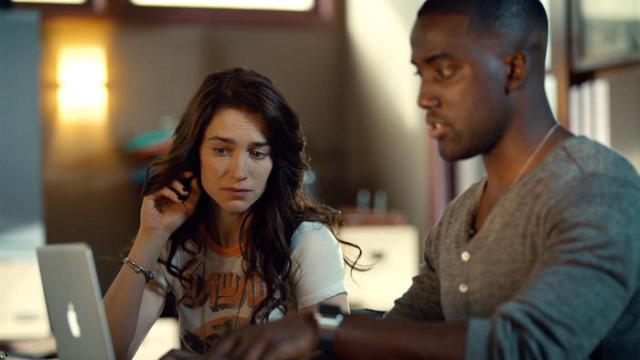





Published: Apr 28, 2016 04:04 pm